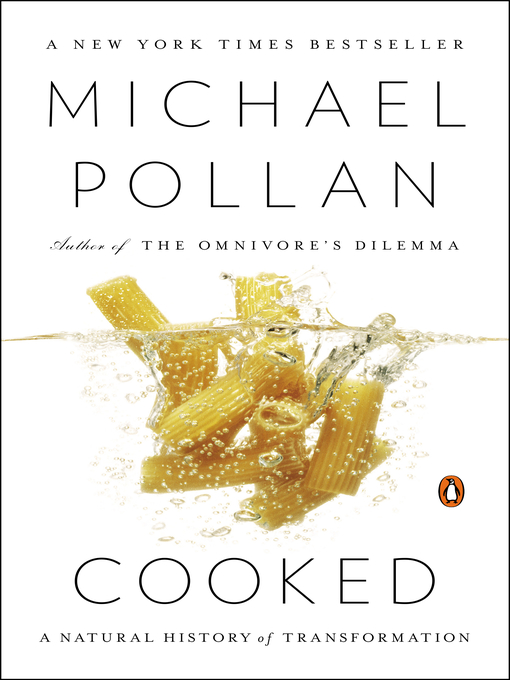- All Fiction
- Military Fiction
- Historical Fiction
- Mystery & Thriller
- Romance
- See all fiction collections

"Having described what's wrong with American food in his best-selling The Omnivore's Dilemma (2006), New York Times contributor Pollan delivers a more optimistic but equally fascinating account of how to do it right. . . . A delightful chronicle of the education of a cook who steps back frequently to extol the scientific and philosophical basis of this deeply satisfying human activity." —Kirkus (starred review)
Cooked is now a Netflix docuseries based on the book that focuses on the four kinds of "transformations" that occur in cooking. Directed by Oscar-winning filmmaker Alex Gibney and starring Michael Pollan, Cooked teases out the links between science, culture and the flavors we love.
In Cooked, Pollan discovers the enduring power of the four classical elements—fire, water, air, and earth—to transform the stuff of nature into delicious things to eat and drink. Apprenticing himself to a succession of culinary masters, Pollan learns how to grill with fire, cook with liquid, bake bread, and ferment everything from cheese to beer.
Each section of Cooked tracks Pollan’s effort to master a single classic recipe using one of the four elements. A North Carolina barbecue pit master tutors him in the primal magic of fire; a Chez Panisse–trained cook schools him in the art of braising; a celebrated baker teaches him how air transforms grain and water into a fragrant loaf of bread; and finally, several mad-genius “fermentos” (a tribe that includes brewers, cheese makers, and all kinds of picklers) reveal how fungi and bacteria can perform the most amazing alchemies of all. The reader learns alongside Pollan, but the lessons move beyond the practical to become an investigation of how cooking involves us in a web of social and ecological relationships. Cooking, above all, connects us.
The effects of not cooking are similarly far reaching. Relying upon corporations to process our food means we consume large quantities of fat, sugar, and salt; disrupt an essential link to the natural world; and weaken our relationships with family and friends. In fact, Cooked argues, taking back control of cooking may be the single most important step anyone can take to help make the American food system healthier and more sustainable. Reclaiming cooking as an act of enjoyment and self-reliance, learning to perform the magic of these everyday transformations, opens the door to a more nourishing life.
-
Creators
-
Publisher
-
Awards
-
Release date
April 23, 2013 -
Formats
-
Kindle Book
-
OverDrive Read
- ISBN: 9781101605462
-
EPUB ebook
- ISBN: 9781101605462
- File size: 1509 KB
-
-
Accessibility
Publisher statement (EPUB)
The publisher provides the following statement about the accessibility of the EPUB file supplied to OverDrive. Experiences may vary across reading systems. After borrowing the book, you may download the EPUB files to read in another reading system.
Summary
Accessibility features highlighted in metadata are based on this ebook's content and format.
Ways Of Reading
Appearance of the text and page layout can be modified according to the capabilities of the reading system (font family and font size, spaces between paragraphs, sentences, words, and letters, as well as color of background and text).
Not all of the content will be readable as read aloud speech or dynamic braille.
Conformance
No information is available.
Navigation
Table of contents to all chapters of the text via links.
Additional Information
Page breaks included
High contrast between text and background
Color is not the sole means of conveying information
-
Languages
- English
-
Reviews

Loading
Formats
- Kindle Book
- OverDrive Read
- EPUB ebook
subjects
Languages
- English
Loading
Why is availability limited?
×Availability can change throughout the month based on the library's budget. You can still place a hold on the title, and your hold will be automatically filled as soon as the title is available again.
The Kindle Book format for this title is not supported on:
×Read-along ebook
×The OverDrive Read format of this ebook has professional narration that plays while you read in your browser. Learn more here.